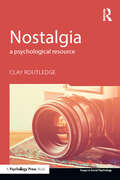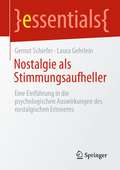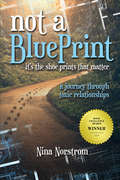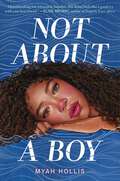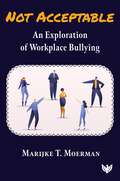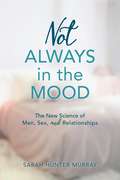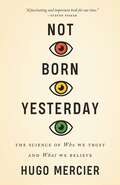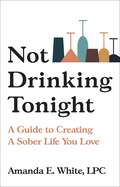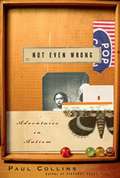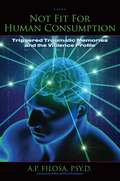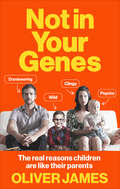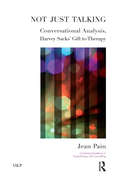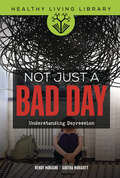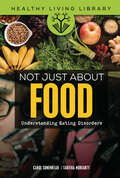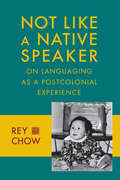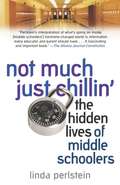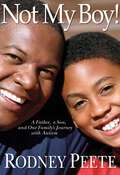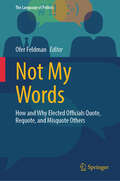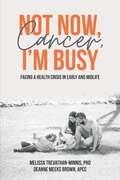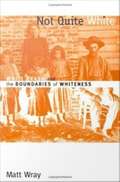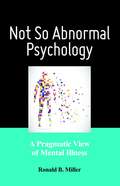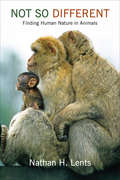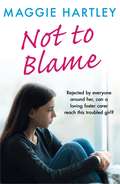- Table View
- List View
Nostalgia: A Psychological Resource (Essays in Social Psychology)
by Clay RoutledgeNostalgia is a topic that most lay people are familiar with, but, until recently, few social scientists understood. Once viewed as a disease, nostalgia is now considered to be an important psychological resource. It involves revisiting personally cherished memories that involve close others. When people engage in nostalgia, they experience a boost in positive psychological states such as positive mood, feelings of social connectedness, self-esteem, self-continuity, and perceptions of meaning in life. Since nostalgia promotes these positive states, when people experience negative states (such as loneliness or meaninglessness), they use nostalgia to regulate distress. This book explains in detail what nostalgia is, how views of it have changed over time, and how it has been studied by social scientists. It explores issues like how common nostalgia is and whether people differ in their tendency to be nostalgic. It looks at the triggers and inspiration for nostalgia, and the emotional states that are associated with it. Finally, the psychological, social, and behavioral effects of engaging in nostalgia are discussed. This volume provides the most comprehensive overview to date of the social scientific research into the complex and intriguing phenomenon of nostalgia. It will be of interest to a range of students and researchers in psychology and beyond, and its accessible writing style and engaging anecdotes will also be appreciated by a wider, non-academic audience.
Nostalgie als Stimmungsaufheller: Eine Einführung in die psychologischen Auswirkungen des nostalgischen Erinnerns (essentials)
by Gernot Schiefer Laura GehrleinDieses essential gibt einen kompakten Überblick über Nostalgie und welche Wirkungen nostalgisches Erinnern auf die eigene Stimmung und weitere psychische Funktionen hat. Ausgehend von einem vorwissenschaftlichen Verständnis des Konstrukts wird gezeigt, wie sich Nostalgie verändert hat und was die wesentlichen Inhalte persönlicher nostalgischer Erinnerungen sind. Die Autor*innen zeigen, wie Nostalgie genutzt werden kann, um positive Auswirkungen auf die eigene Befindlichkeit zu erzielen. Es werden auch Grenzen von Nostalgie dargestellt und gezeigt, wann und für wen nostalgische „Zeitreisen“ nicht vorteilhaft sind. Zudem werden Auswirkungen der Nostalgie auf depressive Personen analysiert.
Not A Blueprint: A Journey Through Toxic Relationships
by Nina NorstromAllowing us to learn lessons, let go of toxicity, and gain insight, relationship can play a powerful role in our lives. They are formed with people, alcohol, animals, battlefields, diseases, drugs, environments, and even our emotions. Whether toxic or nontoxic, relationships are an integral component of daily living. Author Nina Norstrom lost her child to a disease, but that wasn't the only toxic relationship she endured. In this book, she explores the effects that her relationships with grief, pain, trauma, and forgiveness have had on her life. This tale exposes a mother's struggle to escape her world of toxicity, her journey out of the clutches of diseased relationships, and the shoe prints the experiences have left on her family's history. This story in its raw form projects a remarkable voice to the heroic fight, courage, and bravery gained when striking back to wipe out toxic relationships. Its message reveals that life brings many challenges and that each challenge provides lessons to be learned. This book is not intended to be a blueprint for dealing with diseased relationships. It's about the shoe prints: those symbols of life's journey that are left by our experiences. "Not a Blueprint: It's the Shoe Prints that Matter" is an insightful and inspiring personal story of one family's journey through toxic relationships.
Not About a Boy
by Myah Hollis"This debut is a gritty teen drama full of mature themes that unfurl in compassionate ways and will resonate with many readers...Heartbreaking and powerful." —Kirkus Reviews (starred review)"Lucid and luminous." —ALA BooklistEuphoria meets Girl in Pieces in this coming-of-age story of a girl trying to put a grief-stricken past behind her, only to be startled by the discovery of a long-lost sister who puts into question everything she thought she knew.Amélie Cœur has never known what it truly means to be happy.She thought she’d found happiness once, in a love that ended in tragedy and nearly sent her over the edge. Now, at seventeen, Mel is beginning to piece her life back together. Under the supervision of Laurelle Child Services, the exclusive foster care agency that raised her, Mel is sober and living with a new family among Manhattan’s elite. It’s her last chance at adoption before she ages out of the system, and she promised, this time, she’ll try.But a casual relationship with a boy is turning into something she never intended for it to be, causing small cracks in her carefully constructed walls. Then the sister she has no memory of contacts Mel, unearthing complicated feelings about the past and what could have been.As the anniversary of the worst day of her life approaches, Mel must weather the rising tides of grief and depression before she loses herself, and those close to her, all over again.
Not Acceptable: An Exploration of Workplace Bullying
by Marijke T. MoermanA succinct and easy to read description of bullying behaviour in the workplace, this book provides focused background information about the challenging 'interpersonal' and intrapersonal' relationships of the bullying drama. The text is presented in three parts: Part I: The bullying phenomenon, Part II: Narratives of those affected by workplace bullying, and Part III: Bullying and the law. Part I focuses on the complex and multifaceted dynamics of workplace bullying. The environment in which bullying can take place with emphasis on the bully, the target/victim, and the bystander. The different types of bullying, the effects on employees, and the consequences on the organisation are discussed. In Part II, the real narratives of six individuals who have experienced workplace bullying are presented. Their account is followed with a reflection and commentary by each participant. Since the voices of the bullied are seldom heard, it is important to appreciate and understand the impact of bullying behaviour at work through the narratives of the six participants who all give a meticulous account of their own experiences. These full and often painstaking accounts shed light on the impact of seemingly insignificant behaviours and the difficulty therein to raise concerns. The hidden complexities of workplace bullying behaviour are laid bare. As the legal aspect in relation to workplace bullying may not initially enter a therapy session or a discussion by others surrounding a bullying episode, it may at some point arise when an adverse situation is taken further and ends in an industrial tribunal. Therefore, in Part III, employment laws with respect to discrimination and harassment, are discussed across comparable jurisdictions. The book ends with some useful websites and recommended reading. This work is highly recommended for managers, supervisors and leaders, be it in the public sector (e.g. healthcare and education) or the corporate world, and also therapists and management consultants. It is also a must-read for those who have experienced or are experiencing bullying at work to show them they are not alone and give them tools to deal with the repercussions of such behaviour.
Not Always In The Mood: The New Science Of Men, Sex, And Relationships
by Sarah MurrayMen’s sexual desire has long been depicted as high, simple, and unwavering. But the new research around men’s desire tells us this is far from true; and that good sex and relationships are suffering from these long-held misconceptions. In Not Always in the Mood: The New Science on Men, Sex, and Relationships sex researcher and relationship therapist Sarah Hunter Murray presents a lively, timely, and critical exploration of the newest, most surprising science on men and sex, shattering myths about men’s sexuality and helping today’s couples connect more deeply and authentically than ever before. <p><p> One-by-one, Murray examines the most detrimental, deep-held beliefs we as a society promote around men and their desire, and dive into how they affect our intimate relationships daily – and what to do about it. Do men actually crave and enjoy sex more than women? Do men “do the wanting” and prefer the chase? Where do they stand on sexual rejection? What’s the deal with porn? Answering these questions and more, this is a book for modern women and men alike. Moving beyond typical “here’s what he likes” sexual tips, the book empowers readers and offers a completely new perspective on sexuality that will validate men’s experiences and help their partners to a greater understanding of the psychology and emotions surrounding them.
Not Born Yesterday: The Science of Who We Trust and What We Believe
by Hugo MercierWhy people are not as gullible as we thinkNot Born Yesterday explains how we decide who we can trust and what we should believe—and argues that we're pretty good at making these decisions. In this lively and provocative book, Hugo Mercier demonstrates how virtually all attempts at mass persuasion—whether by religious leaders, politicians, or advertisers—fail miserably. Drawing on recent findings from political science and other fields ranging from history to anthropology, Mercier shows that the narrative of widespread gullibility, in which a credulous public is easily misled by demagogues and charlatans, is simply wrong.Why is mass persuasion so difficult? Mercier uses the latest findings from experimental psychology to show how each of us is endowed with sophisticated cognitive mechanisms of open vigilance. Computing a variety of cues, these mechanisms enable us to be on guard against harmful beliefs, while being open enough to change our minds when presented with the right evidence. Even failures—when we accept false confessions, spread wild rumors, or fall for quack medicine—are better explained as bugs in otherwise well-functioning cognitive mechanisms than as symptoms of general gullibility.Not Born Yesterday shows how we filter the flow of information that surrounds us, argues that we do it well, and explains how we can do it better still.
Not Drinking Tonight: A Guide to Creating a Sober Life You Love
by Amanda E. WhiteIn this honest discussion of mental health, the founder of Therapy for Women explores our reasons for drinking alcohol—and the benefits of taking a break. When &“retired party girl&” and popular therapist Amanda White admitted she was an alcoholic, it wasn&’t because she&’d done something outrageous while under the influence, like land herself in jail or get married in Vegas. It was because she realized three things: 1. Alcohol was making her life worse. 2. Moderation wasn&’t helping. 3. She could not be a therapist if she continued to use alcohol to numb her life. Something needed to change—not just her relationship with alcohol, but her relationship with herself. Choosing not to drink can be daunting. It&’s everywhere in our culture, our socializing, and our destressing. And it can seem black or white: you drink, or you don&’t (and if you don&’t, people ask why). That&’s where Not Drinking Tonight comes in. Judgement-free and relatable, Amanda helps you unpack your relationship with alcohol by showing you how to: Find out why you drink. Whether it&’s a glass of wine after work or a weekly bar crawl, your drinking habits can be the result of everything from biology to trauma.Heal your relationship with alcohol. Understand how your relationships have been affecting your life, and learn how to set boundaries and create true self care.Build the sober life you love. Learn what comes next—how to maintain your social life, navigate sex and relationships, and love yourself. Not Drinking Tonight isn&’t a program to stop drinking. It&’s the first book to help you address the root issues that cause you to reach for a drink, and create a life you love—one that is not perfect, but is messy and real and one you are fully present for.
Not Even Wrong: A Father's Journey Into the Lost History of Autism
by Paul CollinsIn Not Even Wrong, Paul Collins melds a memoir of his son's autism with a journey into this realm of permanent outsiders. Examining forgotten geniuses and obscure medical archives, and beginning to see why he himself has spent a lifetime researching talented eccentrics, Collins shows how these stories are relevant and even necessary to shed light on autism.
Not Fit for Human Consumption: Triggered Traumatic Memories and the Violence Profile
by A. P. FilosaThe specter of violence is a persuasive threat in the world affecting individuals, societies and nations. But if the underlying causes of this strife are understood, it can be prevented, treated and eradicated. In "Not Fit for Human Consuption: Triggered Traumatic Memories and the Violence Profile", author Dr. A.P. Filosa, Psy.D., investigates and explains the symptoms of this affliction, offering hope to those wishing to live a normal, healthy, violence-free life.
Not In Your Genes: The real reasons children are like their parents
by Oliver JamesProfessor Robert Plomin, the world’s leading geneticist, said in 2014 of his search for genes that explain differences in our psychology: ‘I have been looking for these genes for fifteen years. I don’t have any’.Using a mixture of famous and ordinary people, Oliver James drills deep down into the childhood causes of our individuality, revealing why our upbringing, not our genes, plays such an important role in our wellbeing and success. The implications are huge: as adults we can change, we can clutch our fates from predetermined destiny, as parents we can radically alter the trajectory of our childrens’ lives, and as a society we could largely eradicate criminality and poverty.Not in Your Genes will not only change the way you think about yourself and the people around you, but give you the fuel to change your personality and your life for the better.
Not Just Talking: Conversational Analysis, Harvey Sacks' Gift to Therapy (United Kingdom Council For Psychotherapy Ser.)
by Jean PainGood relationships depend, above all, on our skills in conversation. Harvey Sacks' method, Conversational Analysis, was the springboard for The author's research into psychotherapy as a social activity that depends for its success on the quality of the therapeutic dialogue. The author wrote this book not only for therapists, but for all those who do not understand what psychotherapy is for and are curious to know how it works. The author offers us new tools for all kinds of conversation to work for, rather than against, us.
Not Just a Bad Day: Understanding Depression (Healthy Living Library)
by Wendy Moragne Tabitha MoriartyDepression affects approximately 280 million people around the world, and it’s only becoming more common. As of 2021, 1 in 5 American adolescents had experienced a major depressive episode in the year prior alone. Depression can occur in anyone, and a variety of factors, from genetics to specific experiences, play a role in its development. With depression becoming increasingly prevalent, it is important to understand the disorder and the causes and symptoms related to it. This helps people identify it and support others or themselves. Not Just a Bad Day highlights what depression is, how it occurs, what treatments are available, and related conditions that may accompany it. Discover more about this widespread disorder.
Not Just about Food: Understanding Eating Disorders (Healthy Living Library)
by Carol Sonenklar Tabitha MoriartyIn the United States, approximately 30 million people suffer from an eating disorder. The prevalence of disordered eating among teens and young adults makes this a timely, informative, and helpful book for readers. Learn about the causes, symptoms, and diagnosis of eating disorders as well as treatments. Resources for identifying, treating, and recovering from eating disorders are provided in the text.
Not Like a Native Speaker: On Languaging as a Postcolonial Experience
by Rey ChowRey Chow is Anne Firor Scott Professor of Literature at Duke University and the author of numerous influential books, including several published by Columbia University Press: Primitive Passions; The Protestant Ethnic and the Spirit of Capitalism; and Sentimental Fabulations, Contemporary Chinese Films. A book about her writings, The Rey Chow Reader, was edited by Paul Bowman. Her work has appeared in more than ten languages.
Not Much Just Chillin': The Hidden Lives of Middle Schoolers
by Linda PerlsteinSuddenly they go from striving for A's to barely passing, from fretting about cooties to obsessing for hours about crushes. Former chatterboxes answer in monosyllables; freethinkers mimic everything from clothes to opinions. Their bodies and psyches morph through the most radical changes since infancy. They are kids in the middle-school years, the age every adult remembers well enough to dread. Here at last is an up-to-date anthropology of this critically formative period. Prize-winning education reporter Linda Perlstein spent a year immersed in the lunchroom, classrooms, hearts, and minds of a group of suburban Maryland middle schoolers and emerged with this pathbreaking account. Perlstein reveals what's really going on under kids' don't-touch-me facade while they grapple with schoolwork, puberty, romance, and identity. A must-read for parents and educators, Not Much Just Chillin' offers a trail map to the baffling no-man's-land between child and teen.
Not My Boy!: A Father, A Son, and One Family's Journey with Autism
by Rodney PeeteIn Not My Boy!, Rodney Peete offers not only a heartrending, candid look inside his personal journey with his son's autism but a first-of-its-kind, inspirational road map that will help families facing similar challenges to move forward. Effectively woven throughout Peete's moving account of his life with his son R.J. are the powerful voices, insights, and dreams of other fathers, high-profile figures as well as unsung heroes, who've traveled this difficult path.Autism affects four times as many boys as it does girls. For their fathers, expectations and hopes are drastically changed--as NFL star Rodney Peete's were when his son R.J. was diagnosed at the age of three. After a period of anger and denial, an all-too-common reaction among fathers, Rodney joined his wife, Holly, in her efforts to help their son. With determination, love, and understanding, the family worked with R.J. to help him once again engage with the world.Eight challenging years later, R.J. has gone from the son one doctor warned would never say "I love you" to a thriving, vibrant boy who scored his first soccer goal while his dad cheered from the sidelines.Praise for Not My Boy!"I wish I had something fancy to say, but this story is simply beyond words--just read it! I vote to make Rodney's book, Not My Boy!, required reading for every first-time, second-time, or any-other-time father."--Will Smith / actor, producer"Rodney Peete writes a compelling book that will help fathers emotionally deal with the challenge of raising a child with autism. The mental toughness of a man all but disappears when faced with this reality, but Rodney's candid message will encourage anyone who is chosen to be on this journey."--Alonzo Mourning, former NBA player"Not My Boy is a must-read for parents--especially dads--who have a child on the autism spectrum. It's inspiring, enlightening, and most importantly, truthful. Rodney gives the reader the real story on how autism can cause total dysfunction in the family, and in even the strongest of marriages, if husband and wife don't work as a team. He opens up his heart, and speaks candidly about his mistakes, all the while learning how to best help R.J. in his battle to overcome the challenges of autism. Their fight is by no means over, but the experiences that he shares will help every family, and every couple, to be better advocates, teachers, and parents."--Artie Kempner, lead director for NASCAR/NFL on Fox"A book every father needs to read! Not My Boy is about unconditional love. I read it in one weekend. . . . It was and is amazing."--Cyd Wilson, InStyle magazine
Not My Words: How and Why Elected Officials Quote, Requote, and Misquote Others (The Language of Politics)
by Ofer FeldmanThis edited collection of studies brings together a number of internationally distinguished scholars to provide a comprehensive and detailed examination of the usage and function of quotations and citations in political rhetoric in a variety of countries around the globe, including North and South America, Europe, the Middle East, and Asia. Chapters consider quotations and citations as important (at times unavoidable) elements of argumentative and persuasive speech (and writing). They examine quotations, on the one hand, as forms of a direct way of providing evidence to support the speaker’s (or writer’s) arguments, statements, or assumptions, that their speech (or writing) is within an already established larger claim, enabling them to say (or write) something about it with authority. On the other hand, chapters maintain that quotations and citations can be also used as a powerful device to refute them. That is, the speaker will quote something in order to knock it down i.e., use it as a springboard to express doubts regarding the original utterance, to criticize, disagree, or ridicule the speaker, or to present the contradictory position. Contributions to this volume explore aspects related to the manner such quotations take place, the forms and genres of rhetoric that they enable, and their effect, as an important topic for political and social psychologists, as well as for communication and linguistics researchers who are interested in the study of the nature of contemporary politics. With only a handful studies systematically considering such aspects of political rhetoric and behavior, this anthology aims to bridge the gap in this area’s scholarly knowledge, while delving into central features of political communication and persuasion and their effect in present-day societies.
Not Now, Cancer, I'm Busy: Facing a Health Crisis in Early and Midlife
by Melissa Trevathan-Minnis Meeks Brown APCCAre you or is someone you love facing a cancer diagnosis in the prime of life? You're not alone. The likelihood of developing cancer in one's lifetime is 1 in 2 for males and 1 in 3 for females, and the numbers are rising. A cancer diagnosis at any age is
Not Proud
by Scott Huot Gw BrazierWanton, whimsical, and weird, this unique collection of anonymous confessions reveals our secrets. Part confessional, part peep show, this can't-put-down collection of anonymous confessions from Notproud.com -- categorized by the seven deadly sins -- showcases the poetic, pathetic, and occasionally bizarre thoughts and behaviors of everyday people. From fondling statues, to vengeful cat-food sandwiches, to an unabashed celebration of cheese, Not Proud feeds our inner voyeur with an array of the best and worst of human behavior.
Not Quite White: White Trash and the Boundaries of Whiteness
by Matt WrayWhite trash. The phrase conjures up images of dirty rural folk who are poor, ignorant, violent, and incestuous. But where did this stigmatizing phrase come from? And why do these stereotypes persist? Matt Wray answers these and other questions by delving into the long history behind this term of abuse and others like it. Ranging from the early 1700s to the early 1900s, Not Quite White documents the origins and transformations of the multiple meanings projected onto poor rural whites in the United States. Wray draws on a wide variety of primary sources--literary texts, folklore, diaries and journals, medical and scientific articles, social scientific analyses--to construct a dense archive of changing collective representations of poor whites. Of crucial importance are the ideas about poor whites that circulated through early-twentieth-century public health campaigns, such as hookworm eradication and eugenic reforms. In these crusades, impoverished whites, particularly but not exclusively in the American South, were targeted for interventions by sanitarians who viewed them as "filthy, lazy crackers" in need of racial uplift and by eugenicists who viewed them as a "feebleminded menace" to the white race, threats that needed to be confined and involuntarily sterilized. Part historical inquiry and part sociological investigation, Not Quite White demonstrates the power of social categories and boundaries to shape social relationships and institutions, to invent groups where none exist, and to influence policies and legislation that end up harming the very people they aim to help. It illuminates not only the cultural significance and consequences of poor white stereotypes but also how dominant whites exploited and expanded these stereotypes to bolster and defend their own fragile claims to whiteness.
Not So Abnormal Psychology: A Pragmatic View of Mental Illness
by Ronald MillerIn this warm and deeply personal text, author Ronald B. Miller offers students a different approach to conceptualizing and treating mental illness. Miller critically examines reigning orthodoxies, such as our tendency to pathologize psychological difficulties and to downplay or ignore subjective experiences of human suffering. He reviews theoretical bases, methods of diagnosis and assessment, and treatments that have long produced successful outcomes, yet have too often been denigrated or ignored by proponents of the dominant approaches to mental health care. This text offers a pragmatic and compassionate approach that can revolutionize readers’ and students' understanding of abnormal psychology.
Not So Different: Finding Human Nature in Animals
by Nathan H. LentsAnimals fall in love, establish rules for fair play, exchange valued goods and services, hold "funerals" for fallen comrades, deploy sex as a weapon, and communicate with one another using rich vocabularies. Animals also get jealous and violent or greedy and callous and develop irrational phobias, just like us. Monkeys address inequality, wolves miss each other, elephants grieve for their dead, and prairie dogs name the humans they encounter. Human and animal behavior is not as different as once believed.In Not So Different, the biologist Nathan H. Lents argues that the same evolutionary forces of cooperation and competition have shaped both humans and animals. Identical emotional and instinctual drives govern our actions. By acknowledging this shared programming, the human experience no longer seems unique, but in that loss we gain a fuller appreciation of such phenomena as sibling rivalry and the biological basis of grief, helping us lead more grounded, moral lives among animals, our closest kin. Through a mix of colorful reporting and rigorous scientific research, Lents describes the exciting strides scientists have made in decoding animal behavior and bringing the evolutionary paths of humans and animals closer together. He marshals evidence from psychology, evolutionary biology, cognitive science, anthropology, and ethology to further advance this work and to drive home the truth that we are distinguished from animals only in degree, not in kind.
Not To Blame - Maggie Hartley ebook short: The shocking true story of a teenager with a tragic hidden past
by Maggie HartleyA new short story from the nation's favourite foster carer.Sixteen-year-old Rebecca has been in care all her life, bouncing from foster carers and children's homes without ever having a permanent home to call her own. Social Services are at a loss as to what to do with the troubled teenager. Prone to violent outbursts and sudden, uncontrollable tantrums, Rebecca has never spent more than a few months in any one placement. When she comes to live with foster carer Maggie Hartley, it seems like there is little hope of Rebecca ever finding a long-term home. Her strange behaviour and sudden flashes of anger present challenges unlike any Maggie has ever seen before.But when a secret from Rebecca's past finally comes to light, it seems that Maggie has finally found the root of this vulnerable girl's out-of-control behaviour. Can Maggie help Rebecca come to terms with her past and realise she's not to blame?
Not To Blame - Maggie Hartley ebook short: The shocking true story of a teenager with a tragic hidden past (A Maggie Hartley Foster Carer Story)
by Maggie HartleyA new short story from the nation's favourite foster carer.Sixteen-year-old Rebecca has been in care all her life, bouncing from foster carers and children's homes without ever having a permanent home to call her own. Social Services are at a loss as to what to do with the troubled teenager. Prone to violent outbursts and sudden, uncontrollable tantrums, Rebecca has never spent more than a few months in any one placement. When she comes to live with foster carer Maggie Hartley, it seems like there is little hope of Rebecca ever finding a long-term home. Her strange behaviour and sudden flashes of anger present challenges unlike any Maggie has ever seen before.But when a secret from Rebecca's past finally comes to light, it seems that Maggie has finally found the root of this vulnerable girl's out-of-control behaviour. Can Maggie help Rebecca come to terms with her past and realise she's not to blame?
